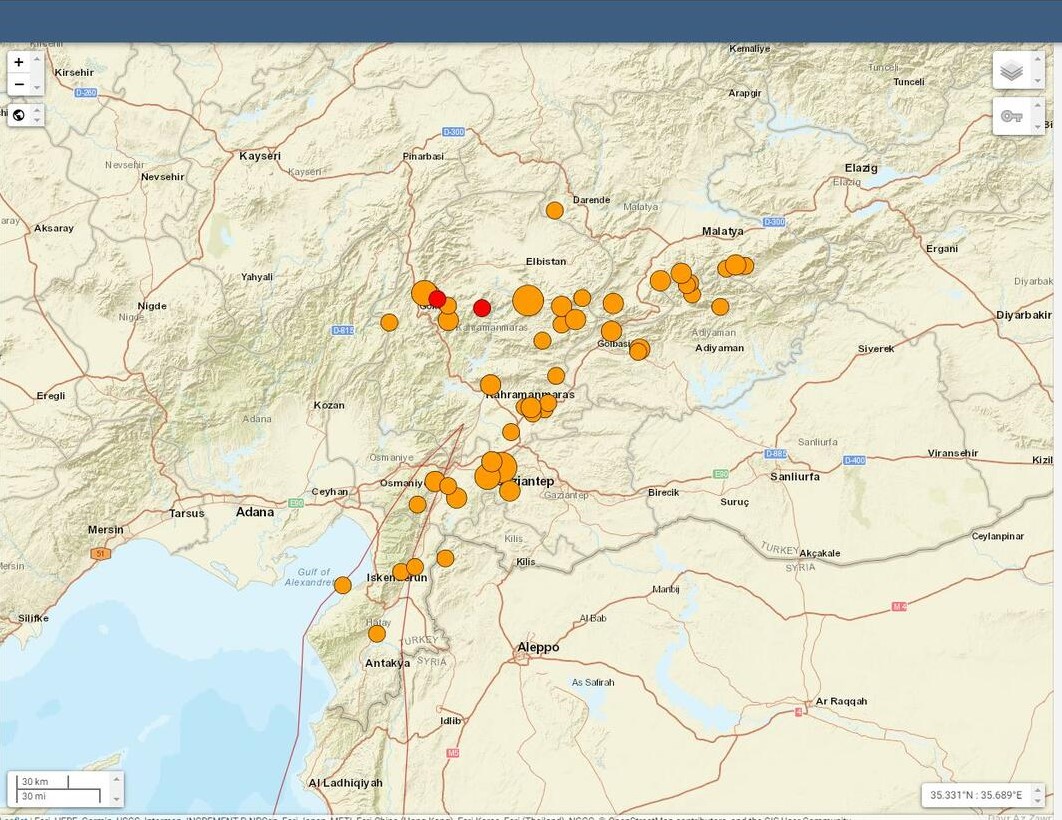ŌĆ£Too much to handle,ŌĆØ is how ║┌┴Ž═° instructor Ayham Abuzeid described the videos and photos he has been receiving from family and friends affected by the massive earthquakes that rocked Turkey and Syria on Monday.
Abuzeid, a native of Aleppo, in northern Syria, is an associate lecturer in the Department of English and an advisor at the ESL (English as a Second Language) Center. He also is a co-owner of Tahini! Mediterranean Cuisine in the basement of the Kent Student Center inside the Rathskeller, and a doctoral student.

ŌĆ£My family is OK, but they are all among hundreds of thousands sitting in their cars on the side of roads away from buildings,ŌĆØ he said. ŌĆ£It is very emotionally draining and painful to hear and see what is going on. Since last night, the messages from family and relatives and videos are beyond believable.ŌĆØ
An earthquake, with a magnitude of 7.8, struck south-central Turkey early Monday, followed by a 7.5-magnitude aftershock that rocked southeastern Turkey and northern Syria, leaving more than 4,300 dead, 20,000 injured and massive destruction in both countries. Since the first quake, more than 60 aftershocks have been recorded throughout the region, according to the U.S. Geological Survey.
News accounts estimate that at least 5,000 buildings have been destroyed between the two countries.
For Yesim Kaptan, Ph.D., an associate professor in the School of Communication Studies in the College of Communication and Information, the devastation hit very close to home.
Her husbandŌĆÖs sister and her family lost their home in Hatay, Turkey, in the quake.
ŌĆ£They called my mother-in-law to say that they are alive, but their apartment building collapsed. After that, we lost connection,ŌĆØ she said.
The family, which includes her sister-in-law, her husband and their two children, was able to leave their apartment before it collapsed and were not hurt, but they are living out of their car in the cold winter weather. There is no electricity or internet service, and they are trying to conserve their cellphone batteries, Kaptan said.
ŌĆ£They are going to move to emergency tents,ŌĆØ she said, ŌĆ£We feel lucky that they are still alive. They got out of the apartment on time.ŌĆØ

Kaptan said the disaster has taken its toll emotionally on her and her husband, who have been working with the Turkish American Association, a nonprofit organization to help raise money and needed supplies for the quake victims.
ŌĆ£Psychologically, we are not doing really great,ŌĆØ she said. ŌĆ£ItŌĆÖs really devastating. We are so shocked by this.ŌĆØ
Joud Roufael, a doctoral candidate in the College of Public Health, and a native of Tartus, Syria, said trying to connect with this family and friends in Syria was nerve-wracking as he awaited their response.

ŌĆ£I am grateful to report that my family and friends are safe but have suffered property damage because of the earthquake and its aftershocks,ŌĆØ he said. Roufael has family in Tartus and Aleppo.
ŌĆ£I extend my sincere condolences to the families of those affected and pray for the recovery and safety of everyone. Syria has been in ongoing civil unrest and the existing lack of basic needs and resources was only made worse by this devastating event. I encourage everyone who can to donate to the ongoing relief funds and aid initiatives,ŌĆØ Roufael said.
Funda Taskiran, a Turkish graduate student in the College of Education, Health and Human Services, said her family and friends live in the capital of Ankara and were not affected by the earthquake damage. However, they were dealing with the emotional toll of the disaster on their country, she said.
ŌĆ£All of them are physically fine but devastated because of the losses and the struggles of the people in those areas,ŌĆØ she said.

